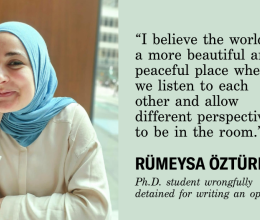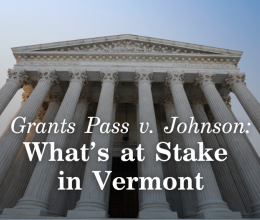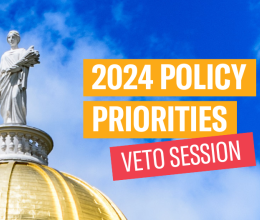An ACLU-VT review of panhandling ordinances on the books in several Vermont municipalities shows that local laws contain provisions that are similar to panhandling laws in three other states recently thrown out by three different federal courts.
In September, the 1st Circuit Court of Appeals struck down a Portland, Maine, ordinance that banned performing any activity on city street medians other than crossing over them. Despite alleged safety concerns, the ordinance was widely known to be targeted at panhandlers. After an ACLU of Maine First Amendment challenge, the court agreed that Portland “chose too sweeping a means” of trying to promote public safety “given the First Amendment interest in protecting the public’s right to freedom of speech.”
In October, two federal district courts ruled against municipalities with so-called “aggressive panhandling” ordinances. A district court judge in Massachusetts overturned anti-panhandling ordinances in the city of Lowell because they unnecessarily proscribed the public’s freedom of speech.
While the judge recognized that some panhandling bans could be justified on public safety grounds in certain areas such as near banks or ATMs, he cited recent Supreme Court precedent to make clear that panhandling bans are unconstitutional because “panhandling is an expressive act regardless of what words, if any, a panhandler speaks.” The Massachusetts judge found that that some of Lowell’s alleged interests were not compelling enough to pass constitutional muster and that the ordinances’ language was not tailored in the least restrictive manner to promote public safety.
Similarly, the Federal District Court of Colorado found parts of Grand Junction’s panhandling ordinances to be unconstitutional because the laws “prohibit protected speech that poses no threat to public safety.”
Ordinances in Vermont municipalities such as Burlington, Bennington, Barre (Section 11-10(c)), and Rutland Town (pages 12-15) are nearly identical to those recently found unconstitutional in Massachusetts and Colorado.
Vermont officials’ interest in panhandling laws comes at a time when Vermont is dealing with a significant homelessness crisis. While the state has expanded services and housing, the efforts have not been nearly enough to assist Vermont’s most vulnerable adults and children.
As the crisis has grown, some cities and towns have sharpened ordinances to prevent “aggressive panhandling,” which typically include bans on soliciting money in an “aggressive manner” or within 10-15 feet of specific public places like storefronts, public telephones, bus stops, and entrances to buildings. The ordinances also typically ban panhandlers from misrepresenting their need for money or how they plan to use it. Infractions can result in a $50 to $500 fine.
Like municipal officials in Massachusetts and Colorado, Vermont local leaders say their ordinances promote public safety, control automobile and pedestrian traffic, and in the case of the Burlington ordinance, maintain an “aesthetically attractive environment designed to attract tourists.”
But aggressive panhandling ordinances do something else. They ban speech, not merely aggressive action. Prohibitions on soliciting near the entrance to a building or from someone who is waiting in a line ban nothing more than the simple act of expressing one’s need for charity. And, while misrepresenting the need or planned use for whatever is received may be deceptive, it is not illegal.
A final twist: Vermont already has state and local laws that address actions that harass, intimidate, or threaten. There’s no need for separate “aggressive panhandling” laws.
Vermont needs to lead the way by dropping these heavy-handed ordinances and replacing them with sensible policies that support the homeless and only restrict free speech when a truly compelling state interest can be demonstrated. As Matthew Segal recently wrote in the Guardian, the U.S. Supreme Court has said that the Constitution allows super-PAC’s and wealthy individuals to express their views by spending millions of dollars. How can it fail to protect people who express themselves by asking for a dollar?
-- Jay Diaz, staff attorney/public advocate






